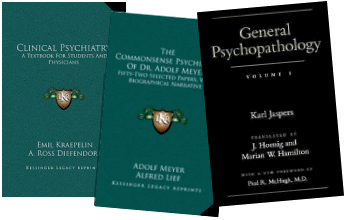I write to you as an American who was once not an American. Of course, all Americans, at one time, were not Americans, but there is still a prototype: the Christian American of European descent. I’m not in that majority, so I write to you as something of an American, but also as a non-American. You ask me what I would advise a young psychiatrist beginning a career in another country? I would first bring to your attention what you already know: the world has one great power—America. This country is not just a military power; it is a cultural force. In psychiatry, it has taken over almost every country at least as effectively as its political forces vanquished Soviet communism. All psychiatry, anywhere in the world, is American psychiatry. This is both bad and good.
First the bad. DSM is a primary source of American domination of world psychiatry. It may not have been meant to be so: it is, after all, the diagnostic system for the American Psychiatric Association. But, as the Soviet Union fell, DSM rose: America’s political triumph translated on all levels, including medicine and psychiatry. The changes of DSM-III in 1980 had become worldwide in their influence by the post–Cold War years of the 1990s…



Honest American psychiatrists know and admit that DSM, by simplifying psychopathology and diagnosis to a bare minimum of criteria, has ruined a generation of clinicians who haven’t heard of anything not included in the manual and whose knowledge of the manual itself is limited to baldly described criteria. A few years ago, Nancy Andreasen, a force in DSM-III, admitted that phenomenology … had literally been killed by DSM-III. This is like a cardiologist who can no longer discern heart sounds, or a neurologist unable to use a reflex hammer.

Psychiatry is simple, so simple: like being a Volkswagen mechanic, a New York clinician infamously stating the painful truth. This false sense of simplicity hides a complex truth: We have lost the ability to accurately recognize our patients’ signs and symptoms; hence, we routinely misdiagnose, then we mistreat. And throughout the process, we have little clue that we might be wrong. And most of the blame has to do with DSM-III onward: simplistic criteria that are often wrong, partly because they are explicitly non–research-based; and when they might be right, DSM’s baleful influence of being a teaching tool, replacing careful phenomenology, has dumbed down the clinical capacities of my generation. So, my first suggestion: live beyond DSM. See it as a tool, a fallible tool, a mostly [but not completely] false tool. Look for the few places where it is based on solid research, and build on those parts. But put it aside as a central approach to clinical treatment: there it fails…hat tip to Jamzo…
While Dr. Ghaemi is focusing on how these code books "dumbed down" psychiatric diagnosis, there were other dramatic changes as a result of the 1980 DSM-III. American psychiatry seemed to sever its ties with its own past [I can’t think of a better way to say that]. The disconnection with its psychoanalytic past and the American psychoanalysts was by design, but it went much further than that. People like Adolf Meyer or Harry Stack Sullivan who were not analysts were also discarded. The generation of psychiatrists from the years before were gradually marginalized and forgotten. It was as if someone had rebooted the specialty, it was born again, and one rarely finds anything much from before 1980 mentioned in the contemporary psychiatric literature.
The DSM-III Revision came in a time of widespread disillusionment from within and without psychiatry. It solved the problems of the day by objectifying the diagnostic criteria hinging on inter-rater reliability as its standard of objectivity. It was followed by an era where evidence-based medicine and its randomized clinical trial became the standard – both were attempts to locate and certify a long-sought objectivity. k [reliability] and p [probability] replaced opinion and intuition as our gold standards. As Ghaemi points out, the downside of the DSM-III was oversimplification and inaccuracy. The downside of the clinical trial was that it became an open conduit for corruption.
I think the cultural aspects of psychiatry cannot be overstated, and unfortunately it’s one of the most neglected aspects of psychiatry training. The same goes for assessing familial and social aspects behind a person’s suffering. This is perhaps one of the worst byproducts of the Western tradition of viewing a person (even a young child) as an individual rather than as part of a larger social and cultural milieu.
Was just reading Barstow on PTSD and think that what is said here can be applied to “problems of living” and problems of being that are compounded by the hegemony of DSM classifications, and the reductionist and dehumanizing face of psychiatry today.
Now, of course, psychiatrists frequently talk as if purported “diseases,” like, for example, schizophrenia, cause symptoms such as low affect. However, as Mirowsky so aptly put it, “patients’ symptoms are not caused by the categories through which doctors perceive and organize symptoms except for the secondary problems arising from labeling”. More generally, as Woolfolk and Mirowsky have argued that the purported diseases are arbitrary groupings of random numbers of ways of thinking and feeling— not natural categories. Correspondingly, in the conversion of behavior and thought into discreet symptoms, holistic integrity is sacrificed; problems in living are individualized; and the complex relationship between behavior, purpose, and context disappears.
As far as I understood the original purpose of DSM-3 (which ain’t very far), weren’t the new categories supposed to be mainly just “operational definitions” for research purposes? A huge problem in research at the time, especially with schizophrenia, was that doctors in different countries, regions, etc. used the same categories but defined them very differently. So one group could announce, for instance, that their new treatment strategy was doing fabulous things for schizophrenics, and the others would just sniff, “Well, that just says to me that your people aren’t real schizophrenics.” They used to call it the “Chinese Menu Approach” (two symptoms from column A, three from column B, etc), which had to betray a certain humility and awareness that they had not discovered the true nature of the underlying diseases.
If true, then I guess that awareness has been totally lost … or deliberately erased. Wiley, the problems you raise are exactly what I’ve been hearing from younger veterans about psychiatric treatment at the VA, sad to say. “You say you can’t sleep? Here’s a sleeping pill. You lose your temper? Here’s an anger pill. You get panic attacks? Here’s a panic pill. Nightmares? Here’s one more pill, this one is for nightmares ….” and the one thing that can be wedged into any of those slots is, god help us, Seroquel. Do you have similar problems with the VA in your area? Or are there pockets of sanity left?
I see a nurse now that is very conservative about the use of medication, vigilant about side effects and not inclined to treat me like a disorder. I’ve been diagnosed as bipolar and had a psychotic episode in January of 2012. She agrees with me that the main thing is that I get enough sleep and is working with me, rather than throwing drugs at me. My VA neurologist said, “Maybe it’s just a one time thing.” He couldn’t say that the new lesions in my brain (MS) did or did not have an effect, but he had no interest in seeing me or having me see myself as having a brain disorder. My Primary Care physician told me that it’s great that I have a friend that knows me really well and to trust my understanding and his observations.
Fortunately, I’m not enough of a priority to see a VA psychiatrist.
Oh, I already went through the drug cocktails with a VA psychiatrist and knew better than to go that way again. I respect and like the man, he was frustrated with the limitations of the system, but no more for me, thank you. I’ve got enough stress to deal with.
http://www.currentpsychiatry.com/article_pages.asp?AID=11050&UID=#
Vol. 12, No. 02 / February 2013
Lab tests for psychiatric disorders: Few clinicians are aware of them
There are 273 biomarkers for schizophrenia, but none are included in DSM-5
Henry A. Nasrallah, MD
….Lab tests for psychiatric disorders are indeed available but their use will not mirror traditional physical exam tests. The complex heterogeneity of most psychiatric syndromes means that biomarkers will help unravel the rich neurobiology of those disorders and help elucidate the multiple neurobiologic underpinnings of these syndromes. Psychiatrists should look forward with great optimism to a bright future for psychiatric diagnosis, combining a set of clinical signs and symptoms with a confirmatory cluster of lab tests. It may take time, but psychiatric clinicians will be using biomarkers in the future and the media and the public finally will perceive psychiatry as a “mature” medical discipline….
http://www.dispatch.com/content/stories/local/2013/03/17/prescription-for-conflict.html
#7
http://www.propublica.org/article/dollars-for-docs-the-top-earners
“Dr. Stephen Strakowski, senior associate dean for research at UC’s College of Medicine, said Nasrallah does not practice and sees patients only in research settings.”
Why bother to connect to the reality of clinical practice? He gets nearly $250,000 per year for fantasizing.